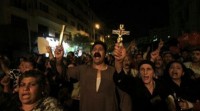Obama abstract on the Middle East, admits Jihadi expansion, ignores Taliban after 2014
In his State of the Union speech of 2013, President Barack Obama addressed several crises in the Middle East and on the front of fighting terror. On Afghanistan President Obama assessed the outcome of his policies as a weakening of the Taliban and committed to a sustained withdrawal from the country while helping the Afghan Government to take the lead in military missions. The role of the US after withdrawal in 2014, according to Obama will be to assist the fight against al Qaeda.- Monday, February 18, 2013

 The credibility of the Arab Spring took a bloody hit on Sunday October 9th when Egyptian Army forces shot dead more than thirty Christian Copts and wounded scores of them. In addition, the action by the Army was paralleled by armed men, described as Salafi Jihadists by Coptic sources, seen also shooting and hitting demonstrators with knives. At a few weeks from the legislative elections in Egypt, this violence impacts the debate about the Spring of Egypt but also challenges US and European policies towards the current and perhaps the forthcoming Government. Can the West support - and fund - a regime that kills members of the weakest community in Egypt, months after the fall of Mubarak?
The credibility of the Arab Spring took a bloody hit on Sunday October 9th when Egyptian Army forces shot dead more than thirty Christian Copts and wounded scores of them. In addition, the action by the Army was paralleled by armed men, described as Salafi Jihadists by Coptic sources, seen also shooting and hitting demonstrators with knives. At a few weeks from the legislative elections in Egypt, this violence impacts the debate about the Spring of Egypt but also challenges US and European policies towards the current and perhaps the forthcoming Government. Can the West support - and fund - a regime that kills members of the weakest community in Egypt, months after the fall of Mubarak?